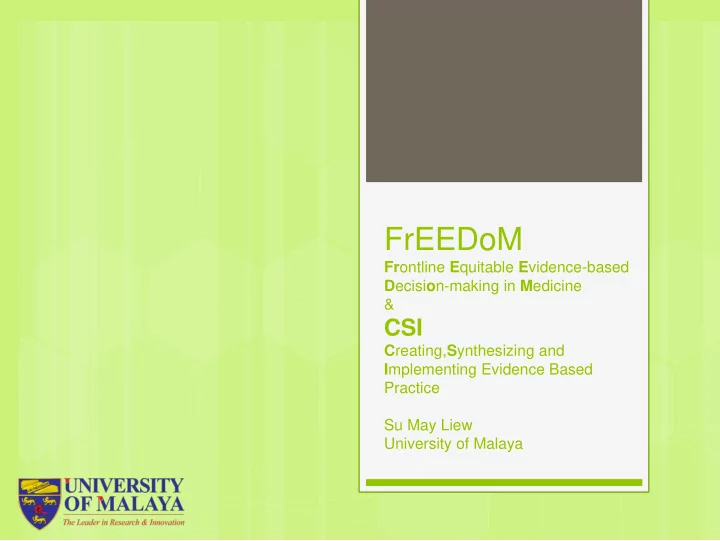

FrEEDoM Fr ontline E quitable E vidence-based D ecisi o n-making in M edicine & CSI C reating, S ynthesizing and I mplementing Evidence Based Practice Su May Liew University of Malaya
Background • Clinicians rarely use or access evidence from research. (2003 UK) • Barriers to EBM in Malaysia -lack of time and internet access. Information sources - specialists, guidelines, textbooks. Only 7% of doctors do a Medline search to solve a clinical problem. (Melaka 2005) • 15% of clinicians had no access to a computer at work. 30% had access but no internet connection. Information sources – books (54%), colleagues (32%), journals (24%), pharmaceutical companies (5%). • Only half of those surveyed from Malaysia had heard of EBM. (SEA 2008)
Research question P: HCPs in Malaysia I: Provision of evidence based answers to clinical questions C: Usual practice O: Improvement in quality of healthcare
First phase Assessment of the barriers to EBM Qualitative (urban and rural) Questionnaire (all clinics)
2 nd phase Development of the intervention
3 rd phase Intervention study a before/after study Controlled trial conducted at clinics Outcomes: Generation of questions and access to information Number of questions answered satisfactorily Changes in management decisions before/after search Audit of changes in prescriptions and investigations Knowledge and implementation of EBM
Initial findings from qualitative analysis • There is still reliance on guidelines and specialists • Better internet access by individuals through own devices • Whatsapp - New ways to get information from old sources!
EBM - Definition It’s supported by something, so if you practice using evidence-based medicine you are supported by “When did you first hear of the term EBM?” something solid. “It wasn’t really in -depth. We heard about it but then we “I’d never heard about it.” don't really care about it … haha.” “Whatsapp" “…It’s our friends. Actually it’s the fastest because I mean ...for example, during an emergency setting and we want the answer, that’s the fastest medium. Of course you can run to home and Google but then that’s not practical …” “… best ever thing designed I guess..” Specialist's opinion “Because later if (there are) medico legal (issues), they are the ones (that are) going to back us up” Guidelines “More concrete that we know where we can (be) based on, based on this CPG. We can always use it and we are safe to follow this and if should something happen to the patient or later on, based on the management that we’ve done, that means you are not in trouble you see? Rather than, oh like say we have the same situation and F will go with the EBM, I’ll go with the CPG, I think I will... I can sleep better at night. I think I can sleep better rather than F, it’s, I think, how it works here. How people take things.”
Recommend
More recommend